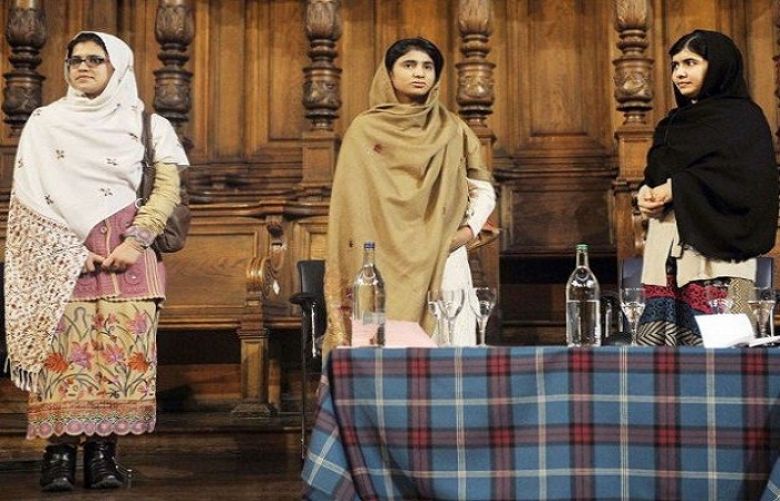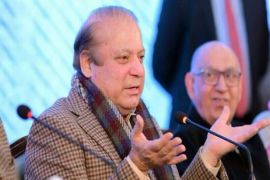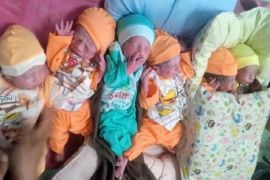When we think about that fateful incident on a Tuesday in October 2012, we nonchalantly associate it with Malala – inherently forgetting that the day changed three lives not one. Kainat Riaz and Shazia Ramzan – two girls who were accompanying Malala home from their school in Mingora after a chemistry exam when Taliban stopped their car and shot at them – have kind of faded away.
Shazia recalls staring out the window, daydreaming while Kainat was discussing exam questions.
“The Taliban stopped us, two boys – or men,” said Shazia. “One was in the front and the other one came to the back. He said: ‘Who is Malala?’ We had our faces covered [with niqabs], but Malala didn’t.”
“We were looking at him and then he shot Malala in the forehead. He shot me on my hand and shoulder, and Kainat’s shoulder as well. Then he started shooting randomly.”
Kainat, who fainted, vaguely remembers seeing Malala fall down to the floor and hearing screams – which Shazia says were hers.
The teenagers were rushed to the hospital – while doctors checked on Malala and Shazia, Kainat says she ran home to her father, a headmaster, and mother, a mid-wife. “Malala died,” Kainat remembers telling her parents.
“I was lost,” she says softly. “I could not sleep because whenever I closed my eyes I thought that guy was going to come and shoot me again.”
Following the attack, Shazia remained in the military hospital for a month, Kainat’s family took her to a local hospital while Malala – who suffered life-threatening injuries, was flown to the UK for surgery.
The world became aware of Malala and the attack on her within hours. She has been honoured by the world, received Nobel Peace Prize, became the youngest UN Ambassador of Peace and recently was given Honoury citizenship of Canada.
In contrast, Kainat and Shazia dealt with the aftermath in obscurity. The girls returned home to hostile attitudes – their neighbours wanted them gone since they were now on the Taliban’s hit-list, their drivers refused to take them to school.
Feeling forgotten, the 19 and 20-year-old were pleasantly surprised when their friend Malala extended a scholarship to study at the international boarding school UWC Atlantic College in the Vale of Glamorgan, South Wales to her friends in Pakistan – one that she had received.
One year after the incident, Kainat and Shazia moved to the UK for high school on a full scholarship. The availed their visas with the help of UN special envoy on global education, Gordon Brown.
But that was not the end of the certainty, the girls now had to adapt and change adhering to the life-style. “Back home, you have to go anywhere with your father, mother or brother, because you are a girl,” said Shazia. “Now I can eat pasta and pizza, which I couldn’t even look at before,” adds Kainat.
British food took time to get used to. Answering a question about Biryani in the UK, Shazia gave a diplomatic answer “They try their best.”
The girls were relatively unknown unlike Malala. “Everyone treats us normally,” says Kainat. “They call us Kainat and Shazia, not Malala’s friends. We are famous in Pakistan. Here, we are not special.”
With no family in the foreign country, the girls had each other to rely on. They were soon dubbed as the “Pakistani twins”. They visit their homes in Swat twice a year but the homesickness has worn-out over the years. They are more focused on adjusting in both worlds.
Malala becomes honorary Canadian citizen
“Some of my friends are married and have children,” explains Kainat. “If I’m wearing jeans and my friends [in Pakistan] see pictures online, they say, ‘you forgot your culture’.”
Her father told her to ignore what people say.
“Before, my mind was closed,” she says. “I thought about education just related to my family. But now I think about all girls. I want to stand up for them,” Kainat talks about her future aspirations.
The two are now ready to head to university and have both received offers to study nursing at Edinburgh. Brown, who has become a mentor, is helping find sources of funding. Malala, on the other hand, has received an offer from a top institution, likely to be Oxford.
The girls feel proud of how far Malala has come, they meet every now and then. “We are really proud,” says Shazia, “we follow her and we will follow her in the future.”
When Malala mentioned them in her speech at the Nobel Laureate in 2014, the teenagers were humbled. “I am not a lone voice. I am many. I am Malala, but I am also Shazia. I am Kainat,” Malala had said.
Both Shazia and Kainat see a future in Pakistan – they want to restart their campaign for education back home. “I believe I should go back to my country and try to make change there,” Kainat insists.
“However we can help, we will,” adds Shazia.
This article originally appeared on The Telegraph.







